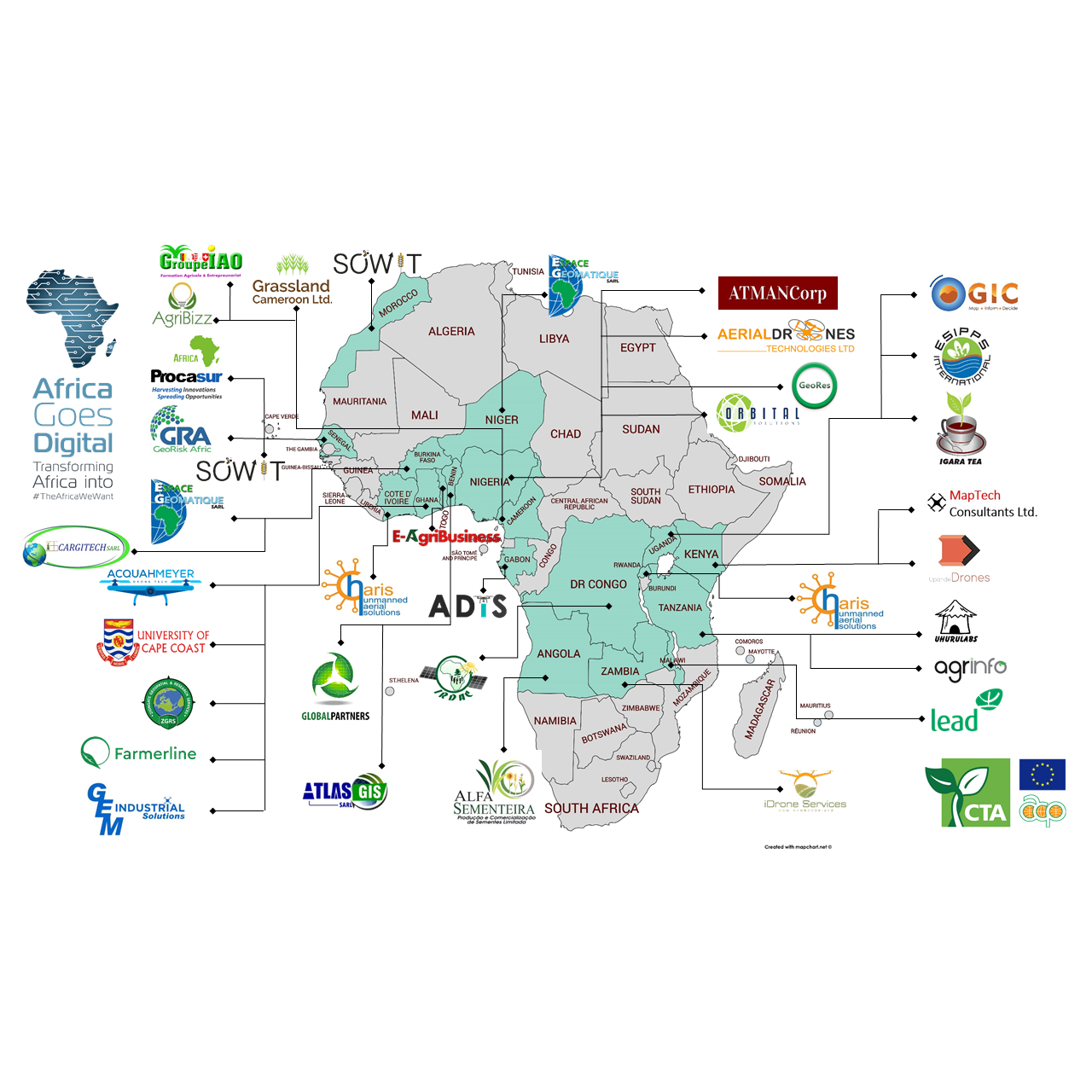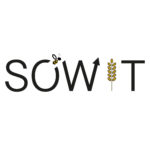The Zimbabwean award-winning start-up Alley Capital Group, assembles drones and offers crop-spraying services. Their equipment is replacing traditional crop spraying platforms which are less efficient and less effective and which can cause serious problems of environmental pollution and pesticide poisoning to human beings. Their drones works more accurately, saving money and increasing productivity. Farmers have welcomed the efficiency and effectiveness presented by drone technology and we currently work with farmers in horticulture. With more training courses, drone spraying can be a way to empower and employ young people in agriculture.
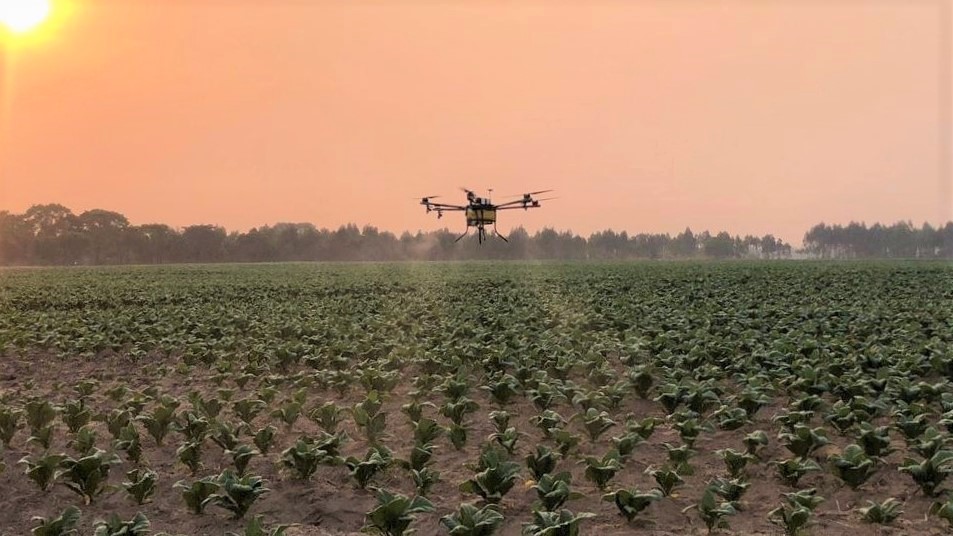
Alley Capital Group is a young Zimbabwean engineering company offering crop spraying services using drones. Agro-chemicals such as fertilisers and pesticides are a major source of environmental and water pollution, and they threaten the health of farm workers who may be exposed to them. These negative effects are mainly related to the shortcomings of traditional crop spraying methods. In August 2018, two aeronautical engineers, well versed in aeronautics and drone technology, joined forces to make a difference in Zimbabwe’s agricultural sector.
Self-funded, our first attempt at acquiring a crop-spraying drone failed due to the high costs of the technology. So we settled on an alternative approach: we mobilised components and successfully assembled the crop-spraying drone that we desired. We introduced this drone to the Zimbabwean market, offering an efficient, effective and sustainable crop spraying alternative. The drone sprayer replaces traditional methods consisting mostly of tractor-drawn boom sprayers, knapsacks and manned aeroplanes, which are by far less accurate and reliable – and which result in environmental pollution levels that will surely impact the future generations. By the end of April 2019 we had carried out five successful demonstrations and proved that the idea was viable – partly as a result of our collaboration agreement with a leading local Agricultural College.
At the 2018-2019 Green EnterPRIZE Innovation Challenge, implemented by the International Labour Organisation (ILO) with support from the Government of Sweden, our company was awarded the “Best Young Entrepreneur” prize and we received financial support in the form of a grant. The funds were pivotal for the mobilisation of the additional equipment required for the commercialisation of our business. Further, we received 12 months of business development support as a service from the ILO, which among many achievements, saw us adopting world class standards and systems to manage our business and operations. Through this service package, we also linked up with the Technical Centre for Agriculture and Rural Cooperation ACP-EU (CTA), and through CTA we joined Africa Goes Digital (AfGD), the largest community of commercial drone operators in Africa. In February 2020, we were awarded the Public Vote award at the Africa Drone Business Challenge in Kigali.
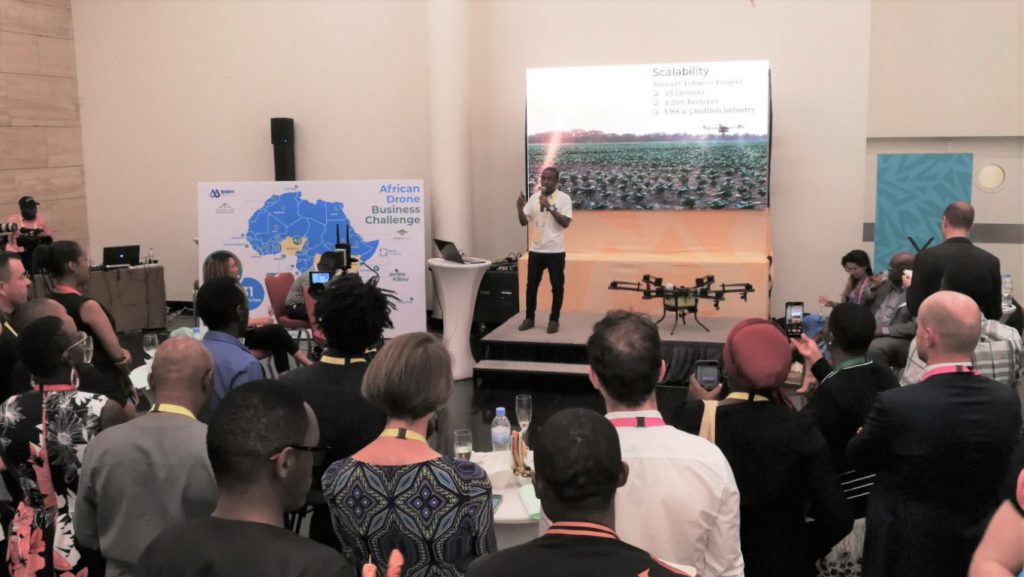
drone-spraying solution at the African Drone Forum, Kigali, February 2020
Drone meets farmers
In June 2019, Alley Capital Group introduced drone crop spraying to the farm operations of three horticultural farmers in the Goromonzi district. In this exercise, the technology matched their particular requirements. Our objective was to improve the effectiveness and efficiency of their crop spraying operations, as this would help reduce their operating costs. More importantly, it would also lead to a reduction of the chemical pollution levels. Farmers regularly rely on tractors for spraying their crop, and apply recommended rates of active ingredients, but lack the accuracy offered by a GPS guided drone to make sure that the distribution of the chemicals is optimised. This results in excess quantities applied in certain areas of the field due to overlapping passages or wastage of it along the sideways. All this affects the biotic environment and the natural water system. Other farmers use knapsacks for spraying, a method that is even less accurate. Our calculations showed that one farmer applied an excess of 120 litres of chemicals per hectare per year. For large-scale operations, the potential negative environmental impact becomes apparent.
The drone sprayer cuts this excess down by a significant margin, providing millilitre accuracy and control with each litre of chemical used. In addition, the drone is battery-powered, eliminating the need for fossil fuels. On average farmers require 6 to 10 litres of diesel per hectare for spraying. The drone offers the opportunity for making use of an alternative power source and offsets the need for diesel which is increasingly scarce and expensive in Zimbabwe. We also aimed to minimise the harmful side-effects farm workers endure due to pesticide poisoning during crop spraying. During a given season, workers report up to four consecutive days of constant exposure to chemicals.

Another of our objectives is to localise drone production by using our available skills and expertise in aeronautical engineering, so that purchase and maintenance of the equipment becomes manageable. One of the most advanced crop spraying drone systems is a Chinese manufactured platform, with a purchasing price of approximately US$ 18,000 and each battery costing US$ 900. To make a profit operating this particular drone, a service provider will need to charge at least 18 dollars per hectare. Such a price discourages farmers, especially medium- and small-scale farmers. We assembled a suitable drone for under US$ 4,000, fit for cheap in-house maintenance and repair and capable of using common off-the-shelf batteries worth approximately US$ 375 each. This enables us to charge a significantly lower price which we have come to prove most medium-scale farmers are willing to pay, especially those currently using fuel-powered tractors with boom sprayer.
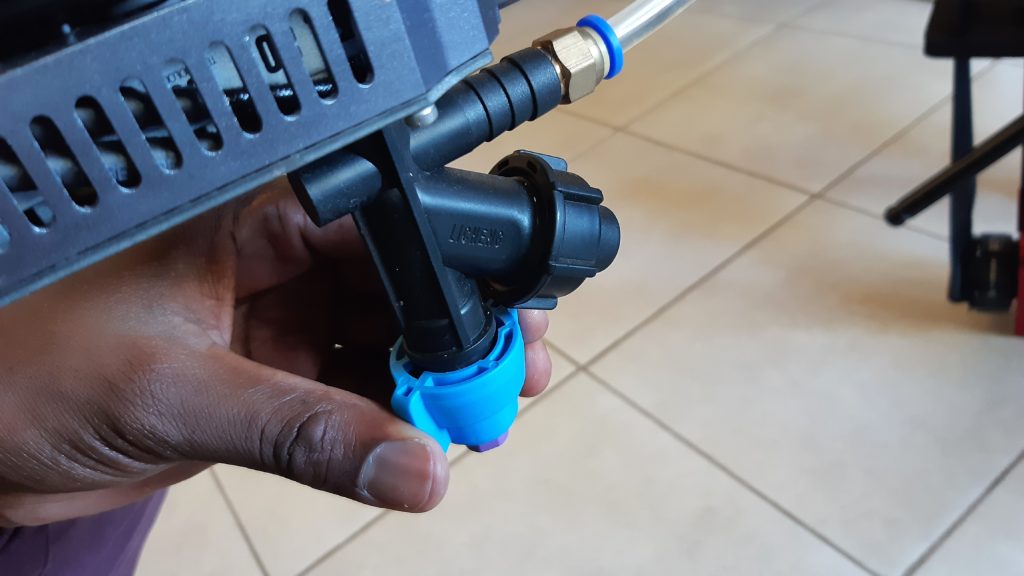
We are, at the moment, the only official drone crop spraying service provider in Zimbabwe. Through our work, it is our hope that drones for crop spraying will in time become the preferred solution. Drones employ an ultra-low-volume spray technology, which has been scientifically proven to be more effective than traditional spraying. In lettuce and cabbage spraying, we have established that where a farmer used to spray 75 litres of solution per hectare using a tractor with boom sprayer, a drone operator would need 20 litres of solution at higher concentration, but with 5% less pesticide per hectare. We intend to invest in further research leading to decreased quantities of pesticides applied per hectare with greater efficiency, accuracy and timeliness.
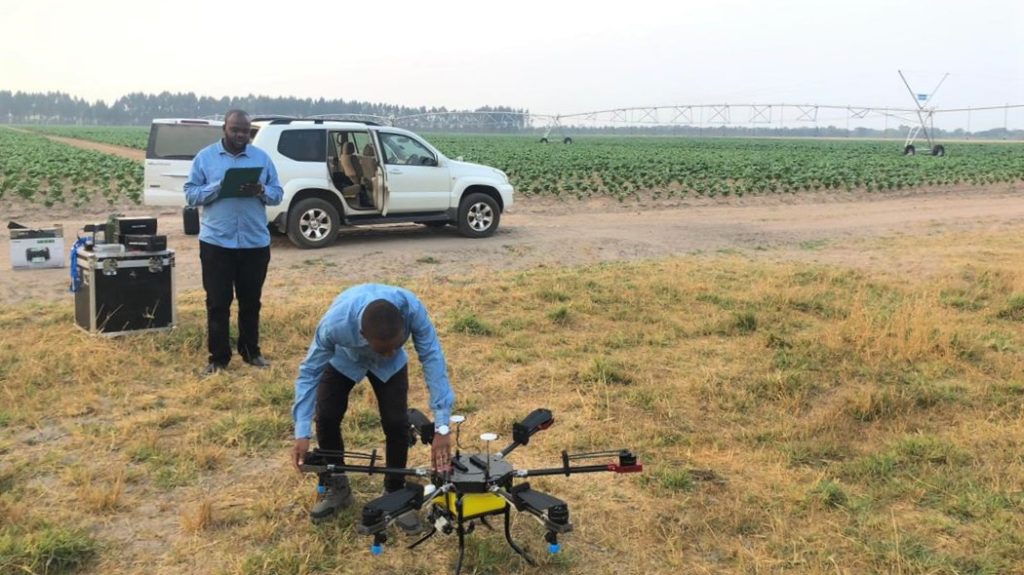
On the other side, we see farm workers who are scared of losing their jobs to increase mechanisation. Furthermore, the drone sprayer is a fairly complex system which is not easily adaptable at the individual farmer level without rigorous training and specialised knowledge. Also, ordering new drone components often takes a long time. We recently ordered extra frame booms and it cost us five weeks. With the appropriate machinery, we could have simply designed and quickly produced the components in-house at a fraction of the cost.
We were surprised to see that some farm workers, particularly the younger generation, are actually interested in learning about drones. With adequate investment in training, farm workers can be absorbed into the system. This becomes true empowerment, promoting decent work for youth through capacity building. This is much more than giving young people the responsibility for manual farm work. Youth empowerment, in our context, is equipping young people with modern skills and teaching them state-of-the-art technologies, a process which offers opportunities – not only in Zimbabwe, but across the continent. In addition, our work has revealed that farmers can also benefit from drone survey and mapping services. We are not currently equipped to deliver them, but we are planning to provide these services in the near future.
Not only farmers can benefit from this solution. Lake Chivero, the primary source of water for the city of Harare, has been seriously affected by pollution to which farming activities are a large contributor. The rising levels of nutrients in water have led to the growth of water hyacinth. This aquatic weed now costs the government millions of dollars to manage. The weed growth also affects aquatic life, which is a source of income for many people in the surrounding areas. At least part of the solution to these problems is known: sustainable practices and the adoption of technologies including drones.
Adoption
One of the ways we measure success is by seeing how well the drone crop spraying technology is adopted. We are currently working with select farmers in citrus, soybean and vegetable farming in Zimbabwe, according to our current capacity. The farmers have since expressed genuine understanding and appreciation of the importance of the technology and are paying for the service. We, however, have not seen much concern for the environment among these farmers as they prioritised the benefits in terms of productivity and costs. One of them was very clear during the discussions we had (“I don’t care about the environment, I honestly only care about farm productivity!”), while another one argued that drones could take peoples jobs. We regularly try to explain that the drone is actually promoting decent work: our future ideal entails a young generation that is actively involved in a modern and efficient agricultural sector.
By presenting the technology, we increased understanding of drones. We had successful exhibitions at the Youth in Agriculture Conference, at the Green EnterPrize Launch ceremony and the 2020 Africa Regional Forum on Sustainable Development, catching the attention of thousands of individuals combined. While most of those we spoke to said they understand how drones work, up to 15 percent of those we spoke to during these events (mostly farmers) mentioned that the drone crop sprayer seemed a little too technical and complex.
Implementing the drone crop spraying technology was made easier with the available funds. We won a US$ 5,000 grant from the ILO, awarded in June 2019. This helped us acquire the necessary accessories, especially batteries and protective clothing for staff, without which our operation would be several steps behind. In addition, we invested personal savings and family contributions of up to US$ 6,000, using these funds to purchase the components needed to assemble our drone, and paying other operational expenses. We also won a cash prize to the value of GBP 2,500 at the Africa Drone Business Challenge and these funds will go a long way towards capacity expansion. At the moment it is very difficult to raise foreign currency funds in Zimbabwe but, being goal-driven entrepreneurs, we believe in the work we do, and are sure that there is no other direction but forward and upward.
Last, policies and regulations regarding drones can be a challenge, but we think we have managed this challenge well so far. As required by law, we placed an application for the registration of the drone in our inventory at the moment. This drone has gone through the due processes at the Civil Aviation Authority of Zimbabwe. Even though the registration framework is yet to be published and implemented by the Civil Aviation Authority, all our operations were pre-approved prior to deployment. As a personal initiative, we developed several control documents, matching international standards, to manage the safety and quality of our operations. These include flight management documents, reporting documents and operational manuals.
Final thoughts and our roadmap
Africa’s agricultural productivity is growing steadily, but at what cost to the environment? Our work with drone spraying technology shows that we can protect our environment without compromising on sustainability and food security. Our environment today is under massive stress, with ever-growing pollution levels resulting from an inadequate and unsustainable use of chemical inputs. This harm extends to all farm workers, with severe poisonings being reported frequently. Drone crop spraying reduces these serious problems, while cutting crop protection costs by up to 30%, and increasing productivity significantly. Our future plans include researching ancient crop protection techniques used by our forefathers, which used less chemicals, discovering how this can be combined with drone spraying. We recommend active support for this and similar innovations across the continent, so that with multilateral backing, we may transform agriculture so that our children’s grandchildren may inherit land that can supply their farming needs, while at the same time supporting the local biodiversity. As a company that genuinely felt the impact of external support at an early stage, we acknowledge the support that we receive from the ILO through the Green EnterPRIZE Innovation and Development Project in Zimbabwe, with support from the Government of Sweden and we encourage continued support across the continent.
About the authors:
Mr Piwai Chikasha
Managing Director
Alley Capital Group Ltd.
Harare, Zimbabwe
Email: piwai@acg.co.zw
Phone / WhatsApp : +263 774692425
www.acg.co.zw
Mr Takudzwa Chipadza
Operations’ Manager
Alley Capital Group Ltd.
Harare, Zimbabwe
Email: takudzwa@acg.co.zw
Phone / WhatsApp : +263 777223213
www.acg.co.zw
